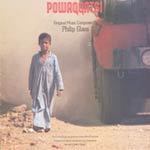
Powaqqatsi Soundtrack
 $40.49
Special Order
$40.49
Special Order3 - 6 weeks add to cart
PHILIP GLASS
Powaqqatsi Soundtrack
Philip Glass Ensemble / Michael Riesman
[ Nonesuch Records / CD ]
Release Date: Friday 7 September 1990
This item is only available to us via Special Order. We should be able to get it to you in 3 - 6 weeks from when you order it.
Virtuoso soundtrack from Philip Glass
Born in Baltimore on January 31, 1937, Philip Glass discovered music in his father's radio repair shop. In addition to servicing radios, Ben Glass carried a line of records and, when certain ones sold poorly, he would take them home and play them for his three children, trying to discover why they didn't appeal to customers. These happened to be recordings of the great chamber works, and the future composer rapidly became familiar with Beethoven quartets, Schubert sonatas, Shostakovich symphonies and other music then considered "offbeat". It was not until he was in his upper teens that Glass began to encounter more "standard" classics.
Glass began the violin at six and became serious about music when he took up the flute at eight. But by the time he was 15, he had become frustrated with the limited flute repertoire as well as with musical life in post-war Baltimore. During his second year in high school, he applied for admission to the University of Chicago passed and, with his parent's encouragement, moved to Chicago where he supported himself with part-time jobs waiting tables and loading airplanes at airports. He majored in mathematics and philosophy, and during off-hours practiced piano and concentrated on such composers as Ives and Webern.
At 19, Glass graduated from the University of Chicago. Determined to become a composer, he moved to New York and attended the Juilliard School. By then he had abandoned the 12-tone techniques he had been using in Chicago and preferred American composers like Aaron Copland and William Schuman.
By the time he was 23, Glass had studied with Vincent Persichetti, Darius Milhaud and William Bergsma. He had rejected serialism and preferred such maverick composers as Harry Partch, Ives, Moondog, Henry Cowell and Virgil Thomson, but still had not found his own voice. Still searching, he moved to Paris and spent two years of intensive study under Nadia Boulanger.
In Paris, he was hired by a filmmaker to transcribe the Indian music of Ravi Shankar into notation readable to French musicians. In the process, he discovered the techniques of Indian music. After researching music in North Africa, India and the Himalayas, he returned to New York, renouncing his previous music, and applying eastern techniques to his own work.
Tracks:
Serra Pelada 5:02
The Title 0:23
Anthem-Part 1 6:22
That Place 4:41
Anthem-Part 2 3:48
Mosque and Temple 4:42
Anthem-Part 3 8:11
Train to São Paulo 3:04
Video Dream 2:14
New Cities in Ancient Lands, China 2:47
New Cities in Ancient Lands, Africa 2:56
